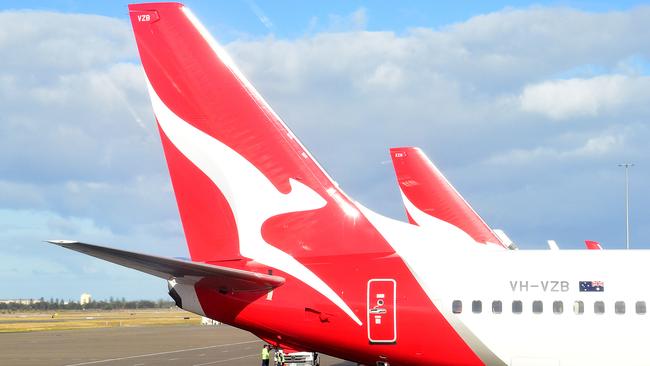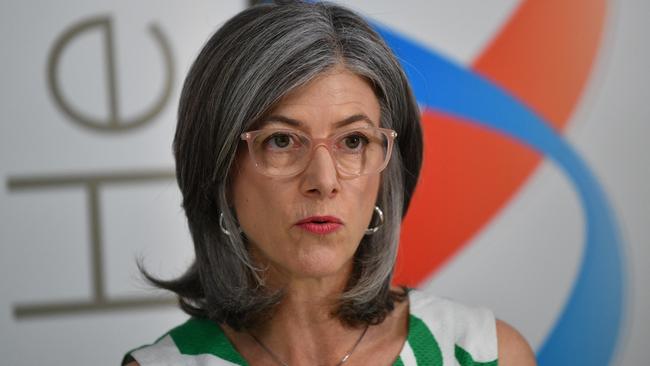Several more cases confirmed overnight after six Qantas baggage handlers test positive to coronavirus
Several more coronavirus cases have been confirmed overnight, connected to six Qantas Adelaide Airport baggage handlers who tested positive to COVID-19 on Tuesday. About 100 other staff are now in quarantine, affecting some Adelaide flights.
Coronavirus News
Don't miss out on the headlines from Coronavirus News. Followed categories will be added to My News.
- Free subscription: Get our four-week digital trial
- Monday’s wrap: Six new cases as wineries close to public
- Latest national and international news
More coronavirus cases have been confirmed overnight, connected to six Qantas Adelaide Airport baggage handlers who tested positive to COVID-19 on Tuesday.
SA’s chief public health officer, associate professor Dr Nicola Spurrier, said “several” new cases emerged after tests were done overnight. However, she did not have exact figures.
“There have been several more cases overnight and I don’t have further details but I will be able to update people later in the day about that,” Dr Spurrier told ABC Radio Adelaide.
“It’s goes to show how transmissible this virus is, particularly when you have people working in close proximity to each other.”
SA Health reported 32 new cases on Tuesday, including six airline workers, only 24 hours after the state recorded one of its lowest daily infection rates.
Renmark North Primary School will also close today, April 1, after a staff member was diagnosed with COVID-19.
As authorities raced to identity the airport cluster source, more than 100 Qantas baggage handlers were placed in a 14-day quarantine.
SA Health and the embattled carrier scrambled to maintain baggage operations as travellers were urged to clean luggage.
Any airport visitor since Monday is urged to seek urgent testing if feeling unwell.
Several airport areas were “extensively cleaned” although officials said none were public.

A Qantas spokesman said that seven Adelaide flights were affected, including one that was turned back to Sydney.
Passengers were put up in hotels and will fly today.
“We are working to minimise any disruptions to customers who are flying in and out of Adelaide, although passenger numbers are significantly reduced due to government travel restrictions,” he said.
“In addition to enhanced cleaning measures introduced since the coronavirus outbreak at airports and on aircraft, we are conducting extensive cleaning of common areas used by these employees.”
Dr Spurrier announced 32 new patients on Tuesday, aged between their 20s and 80s, bringing the state’s total to 337. It not yet clear what the total now is, following the overnight cases.
Monday’s cases include eight men in the Royal Adelaide Hospital’s intensive care unit – five males, aged between 52 and 77, were fighting for life in a critical condition.
No new cases were reported within a Barossa Valley cluster of 34 patients. On Monday, six SA cases were reported – the lowest in almost a fortnight.
Urging people to keep complying with restrictions, Dr Spurrier said officials were urgently investigating if the airport cluster was “community transmission”. There are currently four such cases in which SA Health can’t find an origin.
“We have got a particular issue at Adelaide Airport. because we have had now a number of cases with baggage handlers and we are currently investigating that,” she said.
“We are also currently talking to Qantas about risk mitigation. There is going to be a requirement for a significant requirement of staff to go into quarantine because of this.
“This is a serious situation.

“We have met with Qantas and we are looking at implementing some work to ensure that baggage can be offloaded and I am absolutely hoping there won’t be an interruption to flights. We will be looking very closely at the cluster at Adelaide Airport and if we need to expand the definition on who needs to be tested we will certainly be doing that. But we don’t want to be testing people without symptoms.”
An Adelaide Airport spokesman said the Qantas employees worked in the baggage handling area away from public spaces.
“We are … notifying other stakeholders who work within the terminal precinct, as well as informing and supporting our own staff,” he said.
“SA Health has advised that other areas of the terminal, including public areas, are unaffected at this time.”
Dr Spurrier also rejected Labor criticism of testing, arguing it was still world’s best practice. More than 27,500 people have been tested.
A further three cases were linked to the Ruby Princess cruise ship, taking the total to 74. There are 104 cruise ships cases. Police Commissioner Grant Stevens announced only emergency surgeries could occur while two people were fined $1000 for flouting isolation rules.
Elective surgery banned
New rules around surgery in South Australia have started to fight the spread of COVID-19.
Two kinds of surgery will be allowed in SA from today – emergency surgery to stop the loss of life, limb or permanent disability, or urgent surgery or procedures that would see the same occur within 30 days without surgery.
Police Commissioner Grant Stevens made the declaration today.
Example procedures that may still be carried out include endoscopies, bronchoscopies, interventional radiology and cardiology.
Dr Spurrier said it based on the rationale that the protective equipment was needed for frontline medical staff working with coronavirua patients.
Cruise ship passengers tell of life in quarantine
Hundreds of Australian cruise ship passengers are holed up in quarantine in a Sydney hotel – but it’s nothing like it sounds.
They’re not allowed outside and can’t even open a window. In some cases, they are alone in their rooms for two full weeks – some of the passengers are elderly and others have debilitating conditions.
It might sounds a holiday in a five-star hotel, but those in quarantine say it’s not. Read more here
Vending machines trial for protective equipment
South Australia will trial the use of vending machines to distribute protective equipment to medical staff, including masks, to better keep track of supplies during the coronavirus pandemic.
The trial will be conducted at Adelaide’s Flinders Medical Centre, with SA Chief Nurse Jenny Hurley saying it will allow real-time monitoring of what stocks are available and better regulate the supply across hospitals.
“It will allow us to meet the needs of the teams out there. It’s critically important our staff have the right equipment at the right time,” she said.
Another dozen machines will be ready to roll out shortly if requested by other Local Health Networks, who are monitoring the trial.
They will be activated by a sticker put on appropriate staff security passes which can be swiped at the vending machine.
The trial comes as a local packaging company also gears up to produce 145 million surgical masks in the coming months under an agreement with the federal and SA governments.
The agreement with Adelaide’s Detmold Group will provide 100 million to the National Medical Stockpile and 45 million to SA, as reported by The Advertiser.
“We have a sufficient supply of masks at the moment, but this work will ensure we sustain that supply over the months ahead,” federal Minister for Industry, Science and Technology Karen Andrews said in a statement.
Detmold will employ an extra 160 workers and invest more than $1 million in buying local supplies that will support other businesses.
“This new production line won’t be up and running overnight, that’s why we’re attacking this challenge from all angles, including continuing work to secure further masks out there in the market,” Ms Andrews said.
Detmold Group CEO Alf Ianniello said production will start by May from the company’s manufacturing facility at suburban Brompton.
“We expect to have the capacity to manufacture over 20 million masks per month by June, and the facility will produce both surgical masks and respirator masks,” he said.
The vending machines are among a suite of measures being rolled out to support health staff on the frontline including a “‘heroes’ hotel” for doctors, nurses, SA Ambulance and other medical staff at the frontline of the coronavirus pandemic.
At a press conference on Tuesday morning, Mr Marshall also urged South Australians to stay home this Easter.
“Unfortunately this year Easter holidays are off – we need to stay at home with our families and not travel around the state,” he said. “We need to stay home and save lives.
“Social distancing is the best thing we can do now. If we do this well, we can save lives in South Australia.”
It comes after several regional mayors at the weekend asked tourists to stay away, and Kangaroo Island mayor Michael Pengilly said much on KI was closed.
Let me reinforce the message today that KI attractions, many shops, accomodation, playgrounds , national parks,caravan parks are all closed. Stay home this Easter and school holidays Take a holiday at home!
— Michael Pengilly (@PengillyMichael) March 30, 2020
Police won’t enforce two-people rule
South Australian police will not enforce the Federal Government’s new advice of restricting public gatherings to no more than two people.
Police Commissioner Grant Stevens said officers will continue enforcing the rule that limits gatherings to 10 people.
“That is the direction and that is the enforceable direction,” he said.
“The advice coming from the National Cabinet is that gatherings of two or more should be discouraged and we will certainly be encouraging people to take that as strong advice.
“But, when it comes to enforcement, we will be looking at that 10 or more rule.”
SA Police’s decision to not enforce the two-person rule is in stark contrast to the eastern states.
In New South Wales, people can be fined $11,000 or sent to jail for six months if they leave home without a “reasonable excuse”.
Meanwhile, Victorians could face on-the-spot fines of more than $1600 and $1300 in Queensland for breaching the social distancing guidelines.
Commissioner Stevens said such harsh measures are not necessary in SA, due to the relatively low infection rate and widespread compliance.
But, he did leave the door open to further enforcement over the long weekend.
“As we move through this period of the long weekend forthcoming … if we see significant, unnecessary travel and noncompliance with the requests, then we will revisit the directions and have a look at whether we need to make them even more strict.”
Six new cases, wineries close to public
On Monday night, wine and food sales from winery cellar doors were banned across South Australia to stop the coronavirus spreading, despite the lowest number of new daily cases in almost a fortnight.
SA Health is battling to contain a significant virus cluster of 34 Barossa Valley patients, linked with two groups of American and Swiss tour groups. But amid fears the virus could spread, authorities closed wineries, cellar doors and restaurants to the public.
Their public sale of alcohol and food as well as all tastings in any stores was also indefinitely banned from midnight.
SA Health said just six new patients – five of whom are linked to cruise ships – were reported on Monday, taking SA’s total cases to 305. But eight patients are now in the Royal Adelaide Hospital’s intensive care unit, half of whom were fighting for life in a critical condition. SA’s chief public health officer, associate professor Dr Nicola Spurrier said the lowest daily rise in 12 days was “very positive”.
